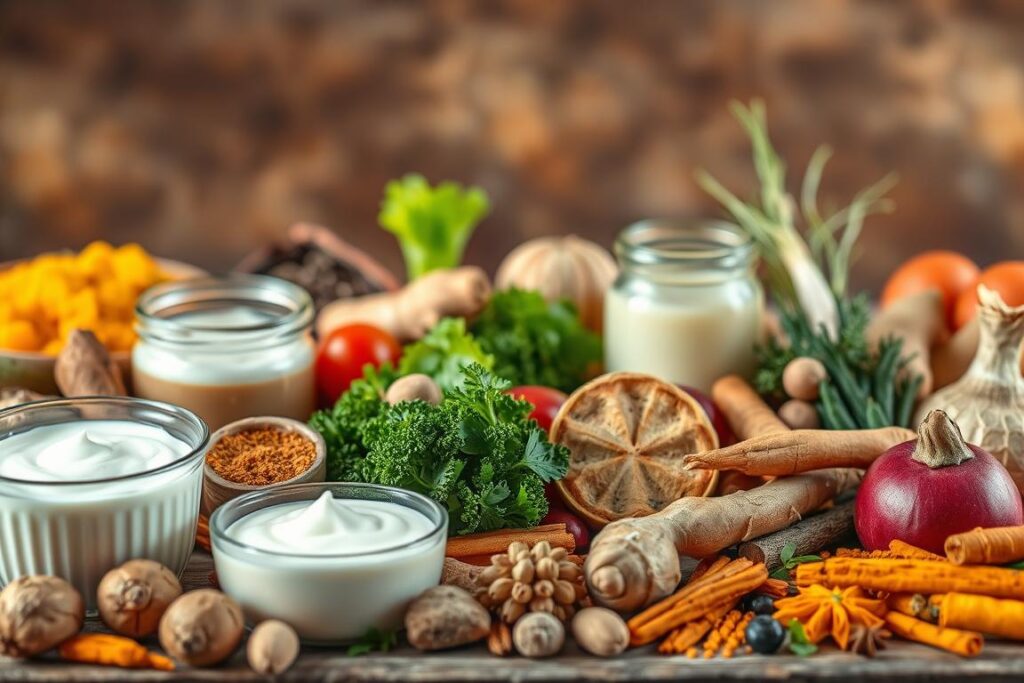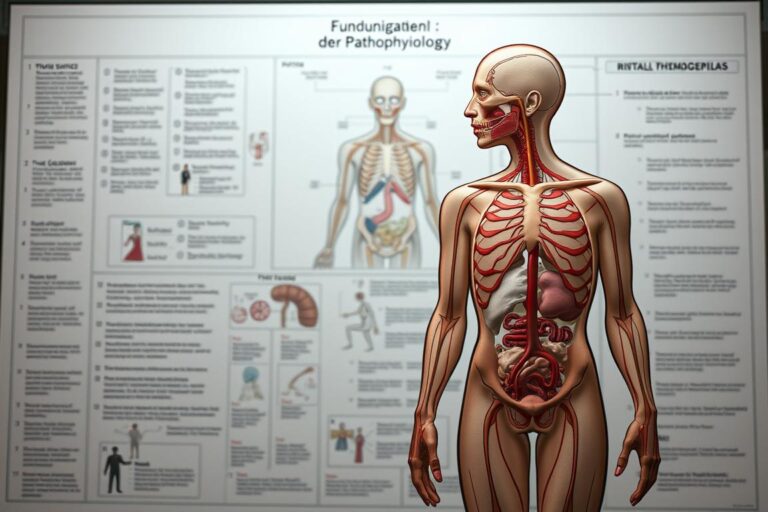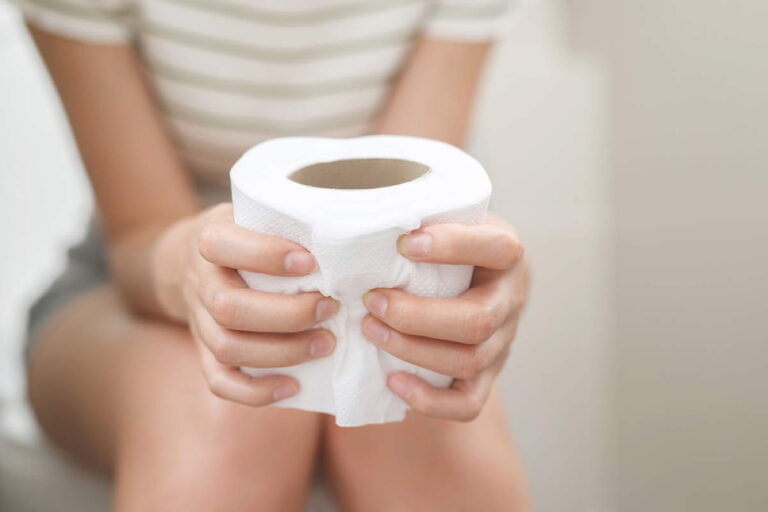What helps against flatulence? Effective solutions
Flatulence is a common digestive problem that affects many people and can lead to unpleasant discomfort. The formation of gasin the intestines can be triggered by various factors, including an unbalanced diet and stress.
Healthy digestion is crucial to prevent bloating. In this guide, you will learn how you can improve your gut health and reduce air in your stomach.
We look at both natural home remedies and medical approaches to provide you with effective solutions to bloating.
Understanding flatulence: Causes and development
The phenomenon of flatulence is widespread and can have various causes. Bloating or flatulence is a condition characterized by excessive gas formation in the body.
How does flatulence develop in the body?
Flatulence occurs when the body produces gases that are not eliminated naturally. This can be caused by various factors such as diet, digestive problems or other health conditions.
Normal vs. excessive flatulence
It is normal for the body to produce gas every day and release air around 10 to 20 times a day. It is only when this number is significantly exceeded or when severe discomfort occurs that we speak of excessive flatulence.
| Feature | Normal flatulence | Excessive flatulence |
|---|---|---|
| Frequency | 10-20 times per day | Significantly more than 20 times a day |
| Complaints | No or minor complaints | Severe discomfort, pain |
| Quality of life | No impairment | Significant impairment |
Common symptoms of flatulence
Flatulence often manifests itself through a range of symptoms that can severely affect your well-being. These symptoms can be very diverse.
Flatulence and bloating
A bloated stomach and a feeling of fullness are common side effects of flatulence. The abdominal girth can increase noticeably, causing discomfort.
Accompanying complaints
Accompanying symptoms such as abdominal pain, cramps and changes in bowel movements can occur. Nausea and a feeling of incomplete bowel evacuation can also be associated with this.
Dietary causes of flatulence
The link between diet and bloating is complex and multi-layered. The way we eat and the foods we choose play a crucial role in the development of bloating.
Flatulent foods
Certain foods can promote flatulence due to their composition. These include pulses, cabbage and some dairy products. These foods are difficult to digest and can lead to gas formation in the intestines.
- Legumes such as beans and lentils
- Cabbage and other cruciferous vegetables
- Dairy products, especially with lactose intolerance
Eating habits and their effects
„Problems often start in the mouth when food is not chewed thoroughly and eaten too hastily,“ says Dr. Weber. Food should be chewed thoroughly and eaten in peace to aid digestion.
Hasty eating and insufficient chewing can lead to incomplete digestion and cause bloating. It is important to take your time when eating and listen to your body’s signals.
Food intolerances as a trigger
Intolerances to certain foods can lead to significant digestive problems. One of the most common forms is lactose intolerance, in which the body cannot digest milk sugar properly.
Lactose intolerance
In this disease, the enzyme lactase, which breaks down lactose, is missing. Undigested lactose enters the large intestine, where it is fermented and causes symptoms such as flatulence.
Fructose intolerance
Another common intolerance is fructose intolerance. In this case, the body cannot absorb enough fructose, which leads to similar symptoms.
Gluten intolerance
Gluten intolerance, also known as coeliac disease, is an autoimmune disease in which gluten damages the intestinal mucosa. This leads to bloating and other gastrointestinal problems.
Stress and psychological factors
The connection between our brain and gut plays a crucial role in the development of bloating. Stress and emotional strain can therefore cause stagnant digestion and painful cramps, as Dr. Weber explains.
The gut-brain connection
The close connection between the brain and gut means that stress and emotional states can directly affect our digestion. This underlines the importance of taking a holistic view of gut health.
Stress management for a healthy gut
Effective stress management can reduce bloating. Strategies include relaxation techniques such as progressive muscle relaxation and meditation, regular exercise, adequate sleep and mindful eating to minimize stress at mealtimes.
- Relaxation techniques help to restore the balance between the sympathetic and parasympathetic nervous systems.
- Regular exercise reduces stress and promotes bowel movement.
- Sufficient sleep is essential for regeneration and a healthy intestinal flora.
- Mindfulness when eating reduces stress and improves digestion.
What helps against flatulence: Proven home remedies
If you suffer from bloating, some simple home remedies can provide great relief.

Medicinal herbs and teas
Medicinal herbs and teas such as peppermint, camomile and fennel can help to relieve flatulence. These herbs have an antispasmodic effect and can aid digestion.
Heat applications
Applying heat to the abdomen can also be very helpful. A hot water bottle or a warm bath can relax the muscles and promote bowel movement.
Abdominal massage and exercise
A gentle clockwise abdominal massage can loosen stuck gas and stimulate natural bowel movement. Light physical exercise such as walking or yoga exercises can also help to relieve bloating.
Integrate decongestant foods into your diet
Integrating decongestant foods into the diet can be an effective strategy against bloating. A targeted diet can help to support the intestinal flora and alleviate the symptoms of bloating.
Herbs with a digestive effect
Certain herbs can aid digestion and reduce flatulence. Examples of this are peppermint, caraway and fennel, which are traditionally used to alleviate digestive complaints.
Probiotic foods
Probiotic foods contain live microorganisms that can have a positive effect on the intestinal flora. Examples of probiotic foods are yoghurt, buttermilk and kefir, which contain lactic acid bacteria and support digestion.
| Probiotic food | Advantages |
|---|---|
| Yoghurt | Supports digestion with lactic acid bacteria |
| Buttermilk | Contains lactic acid bacteria that promote the intestinal flora |
| Kefir | Rich in various probiotic cultures |

Change of diet for frequent flatulence
A change in diet can bring great relief from frequent bloating. Instead of three main meals, five smaller meals can relieve the feeling of fullness in the intestines.
Introducing a high-fiber diet correctly
A high-fiber diet can help to reduce bloating. However, it is important to gradually increase the fiber intake to get the intestines used to the new diet.
| Advantages | Disadvantages |
|---|---|
| Reduces flatulence | Can lead to flatulence at first |
| Promotes digestion | Requires a gradual changeover |
Meal planning and portion sizes
Dividing your food intake into several smaller meals can relieve the digestive tract and reduce bloating. Smaller portions are easier for the gastrointestinal tract to process.
- Bloating and non-bloating foods should be consciously combined.
- Evening meals should be easy to digest and should be eaten at least three hours before going to bed.
A food diary can help to identify problematic meal combinations and adjust the diet accordingly.
Medication to help with flatulence
If flatulence causes severe discomfort, medication can provide relief. There are various approaches to treating flatulence with medication.
Defoaming preparations
Defoaming preparations can help to reduce the surface tension of gas bubbles in the intestine, making them easier to absorb or excrete.
Antispasmodics
Antispasmodics such as butylscopolamine (Buscopan) can help with painful „pinched winds“ by relaxing the muscles of the digestive tract. They are particularly helpful for cramp-like abdominal pain.
Exercise and sport as a natural bloating aid
Regular exercise can help to reduce bloating. An active lifestyle supports digestion and can lead to long-term relief from bloating.
Exercises to aid digestion
Certain exercises can aid digestion and relieve bloating. Moderate exercise such as brisk walking, cycling or swimming for at least 30 minutes a day can improve bowel function.
Regular activity in everyday life
Integrating exercise into everyday life, such as climbing stairs or short walking breaks during sedentary activities, continuously supports digestion and reduces stress, which often leads to digestive complaints.
Flatulence in special phases of life
Certain phases of life can favor the occurrence of flatulence. At these times, various factors can come together to influence digestion and lead to bloating.
Pregnancy and flatulence
During pregnancy, women can be increasingly confronted with bloating. Adjusting your diet can help: Carrots, fennel or tomatoes are often easier to digest than cabbage and legumes. Avoiding carbonated drinks can also provide relief. Teas with fennel, aniseed or caraway can be helpful in relieving flatulence. A gentle abdominal massage can also have a positive effect.
Hormonal changes in women
Hormonal fluctuations in the female cycle can affect digestion and lead to bloating. Particularly in the second half of the cycle, when progesterone levels rise, intestinal activity can slow down, which promotes bloating. During menstruation, prostaglandins can affect the intestinal muscles and lead to diarrhea and flatulence. During the menopause, hormonal changes can also affect digestion. Hormonal contraceptives can also lead to increased flatulence in some women.
- Hormonal fluctuations can influence digestion.
- Progesterone can slow down intestinal activity.
- Prostaglandins can influence the intestinal muscles.
- Hormonal changes during the menopause can cause bloating.
- Hormonal contraceptives can impair bowel function.
When to go to the doctor for flatulence?
A visit to the doctor is advisable if flatulence is accompanied by other symptoms. In such cases, it is important to find the cause of these symptoms.
Alarm signals and warning signs
If, in addition to flatulence, other symptoms such as bloating, nausea, abdominal pain or changes in bowel movements occur, you should see a doctor. „Blood in the stool or weight loss are alarm symptoms that require an examination,“ says a doctor.
Diagnostic possibilities
If bloating persists, the doctor can use various diagnostic procedures to determine the causes.
- The basic diagnosis includes a detailed medical history, a physical examination and, if necessary, blood and stool tests.
- Specific tests for food intolerances can provide information about lactose, fructose or sorbitol intolerance.
- Imaging procedures such as ultrasound, X-ray or CT of the abdomen can reveal structural changes or blockages in the digestive tract.
The following table provides an overview of the possible diagnostic procedures:
| Diagnostic procedure | Purpose |
|---|---|
| Anamnesis interview and physical examination | Initial assessment of symptoms and causes |
| Blood and stool tests | Check for inflammation or infection |
| H2 breath test | Detection of food intolerances |
| Ultrasound, X-ray or CT | Structural changes or blockages in the digestive tract |
Possible diseases behind chronic flatulence
Chronic bloating can be an indication of various conditions that require an accurate diagnosis. If bloating occurs over a longer period of time, it is important to identify the underlying causes.
Some of the possible conditions behind chronic bloating include irritable bowel syndrome, inflammatory bowel disease and other digestive tract disorders.
Irritable bowel syndrome
Irritable bowel syndrome is a common condition that can lead to chronic bloating. It is characterized by a combination of symptoms such as abdominal pain, bloating and changes in bowel movements.
Chronic inflammatory bowel diseases
Chronic inflammatory bowel diseases such as Crohn’s disease and ulcerative colitis can also lead to persistent bloating. These diseases cause chronic inflammation in the digestive tract.
Other diseases of the digestive tract
Other possible causes of chronic flatulence include constipation, diverticulosis, intestinal parasites and bacterial overgrowth in the small intestine (SIBO). In rare cases, tumors in the digestive tract can also cause bloating.
- Chronic constipation can promote bacterial fermentation and thus increase gas formation in the intestine.
- Diverticulosis can lead to local inflammation and flatulence.
- Intestinal parasites and SIBO can disrupt normal digestion and lead to increased gas formation.
Prevention strategies for a bloating-free everyday life
A bloating-free everyday life can be achieved by integrating a few simple strategies into your daily routine. These include targeted nutritional planning and mindful eating.
Mindful eating
Mindful eating can help to reduce bloating. This means eating slowly, chewing thoroughly and listening to your body’s signals. In this way, you can determine which foods are tolerated and which are not.
Keep a food diary
Keeping a food diary is an effective way of identifying individual triggers for bloating. By writing down everything you eat and drink over a period of two to four weeks, as well as any symptoms that occur, you can recognize patterns and react accordingly.
By combining mindful eating and keeping a food diary, you can adjust your diet and minimize bloating.
Promote long-term intestinal health
The key to a bloat-free future lies in promoting gut health. A healthy digestive system is crucial for our general well-being.
Building a healthy intestinal flora
A balanced diet plays a crucial role in building healthy intestinal flora. Probiotic foods and prebiotics can help to strengthen the intestinal flora and reduce bloating.
Holistic approach to digestive health
In addition to diet, a holistic approach also takes exercise, stress management and sufficient sleep into account. Regular physical activity promotes bowel movement and reduces stress. Sufficient sleep is important for the regeneration of the digestive system. Relaxation techniques such as meditation or yoga can have a positive influence on the gut-brain axis.
Effective solutions for a pain-free life
The management of bloating requires an individual approach that is tailored to the personal triggers.
A combination of dietary adjustments, regular exercise and stress reduction can effectively alleviate bloating. If symptoms persist, it is advisable to seek medical advice, especially if warning symptoms such as blood in the stool or persistent abdominal pain occur.
With the right management, those affected can go about their daily lives largely free of symptoms and improve their quality of life.





